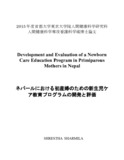Please use this identifier to cite or link to this item:
http://archive.nnl.gov.np:8080/handle/123456789/393| Title: | Development and evaluation of a newborn care education program in primiparous mothers in Nepal |
| Authors: | Sharmila, Shrestha |
| Keywords: | Neonatal care Neonatal morbidity Newborn Care Knowledge questionnaire State Trait Anxiety Inventory for Adults Karitane Parenting Confidence scale Infant health care |
| Issue Date: | 9-Nov-2017 |
| Abstract: | The health and survival of newborns depend on high levels of attention and care from others. The mother is the most important person who looks after and meets the physiological and psychological needs of the child, in the early years of life. Adequate knowledge about how to provide necessary care for an infant during the neonatal period can raise a mother's confidence regarding infant care and it can reduce false and traditional beliefs about neonatal care and neonatal morbidity and mortality rates. Therefore, a mother must have accurate knowledge and take appropriate actions to raise a healthy child. This study was a randomized controlled trial designed to determine the impact of a structured newborn care education program to promote maternal and infant health in Nepal. Participants included 143 primiparous mothers (69 in intervention and 74 in control group) who had delivered a full-term healthy baby. Eligible and consenting mothers were randomized to either a control group (routine education about newborn care) or an intervention group (routine education about newborn care plus a structured educational program). Participants allocated to the intervention group received a one-to-one educational session lasting approximately 10-15 minutes, with a trained registered nurse in the hospital prior discharge. In addition, they received a follow-up telephone call to offer support at two weeks postpartum. Outcomes were measured by the Newborn Care Knowledge Questionnaire, State Trait Anxiety Inventory for Adults, and Karitane Parenting Confidence scale; prior to intervention at the postnatal unit and at 5 to 6 weeks of postpartum at the follow-up appointment. The infants health and care questionnaire were measured at postpartum only. The decrease in the number of children attending the health center in the intervention group compared to the control group was significant, which revealed that our structured newborn educational and support program promote infant health. The results further revealed statistically significant differences between the intervention and control groups in their maternal knowledge of newborn care, anxiety, and their confidence during the postpartum period, indicating that the newborn care educational program increased mothers’ knowledge and their confidence in newborn care, and decreased maternal anxiety during the postpartum period. Moreover, there was an inverse relationship between anxiety and maternal knowledge about newborn care and confidence, whereas, a positive relationship between maternal knowledge of newborn care and confidence, which suggest that new mothers with adequate knowledge of newborn care will be less likely to experience anxiety and should have a healthy level of maternal confidence. On the other hand, new mothers with insufficient knowledge will be more likely to experience anxiety and have lower levels of maternal confidence. In conclusion, the structured educational program for newborn care enhanced the infant and mother health. This type of education is also expected to improve the overall health of mothers and infants, which should reduce the neonatal and maternal mortality and morbidity rates in Nepal. Thus, this program has the potential to become a powerful nursing intervention for virtually all mother and infant-health concerns. This type of education is feasible and easy to deliver; thus, it is important to integrate it into routine newborn care education to promote maternal and infant well-being in the Nepalese society. |
| Description: | A thesis submitted to the Faculty of the Human Health Science of Tokyo Metropolitan University in partial fulfillment of the requirements for the degree of DOCTOR OF PHILOSOPHY in Nursing Science, Japan, 2015. |
| URI: | http://103.69.125.248:8080/xmlui/handle/123456789/393 |
| Appears in Collections: | 600 Technology (Applied sciences) |
Files in This Item:
| File | Description | Size | Format | |
|---|---|---|---|---|
| Sharmila Shrestha PhD THESIS.pdf | 2.79 MB | Adobe PDF |  View/Open |
Items in DSpace are protected by copyright, with all rights reserved, unless otherwise indicated.